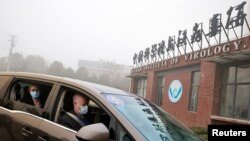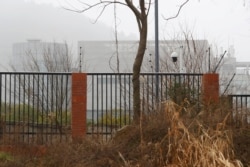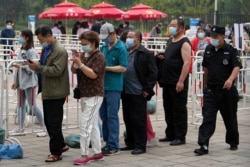Analysts say there is increasing interest in determining whether the coronavirus leaked from a research lab in Wuhan, China, where the deadly virus was first detected in humans, as the U.S. intelligence community acts on President Joe Biden's directive to "redouble" efforts to investigate the origins of COVID-19.
Michael Pillsbury, director for Chinese strategy at the conservative Hudson Institute, a Washington, D.C., think tank, said he expects U.S. intelligence agencies to integrate all available information before reporting to Biden, who set a 90-day deadline when he ordered the probe on May 26.
Pillsbury suggested that investigators examine satellite imagery and interview researchers. "Frankly, part of the study I advocate should include asking Chinese officials and researchers, 'What do you know?'" the former Trump adviser told VOA Mandarin.
China, however, has already blasted Biden's investigation. The day after the U.S. president requested it, Zhao Lijian, a spokesperson for the Foreign Ministry, said in a regular press briefing that "the U.S., instead of examining its own behavior, attempted to scapegoat China. What are they up to?" The pandemic's toll in the U.S. is the world's worst, with slightly more than 33,334,000 million cases and 596,723 deaths as of Friday, according to the Johns Hopkins University Coronavirus Research Center.
VOA contacted the Chinese Embassy in Washington, D.C., and the Foreign Ministry in Beijing on Friday for further comment but has received no responses.
Dan Garrett, a former Pentagon intelligence analyst, told VOA Mandarin that while the possibility of a lab leak had been dismissed in previous investigations, he expects the current probe will follow the scientific evidence rather than bend to political interests.
Or, as Rolling Stone put it, what has happened since then-President Donald Trump backed the lab-leak theory "has been an example of the complicated relationship between science and politics."
According to the magazine, "What started as a science-based hypothesis, had, in Trump's hands, morphed into an attempt to blame everything on China, firmly rooted in anti-Asian racism."
The result was that those calling for a scientific investigation of the lab were lumped together with right-wing Trump conspiracy theorists, and both were discredited, then dismissed, according to the magazine.
Over the past two months, the lab-leak theory began its shift from a crackpot notion to a possibility worthy of consideration.
On March 30, the World Health Organization released a report from a fact-finding trip to the Wuhan lab that concluded that a natural origin of COVID-19 was "likely to very likely" and a laboratory accident "extremely unlikely."
The report met with such criticism — "WHO's COVID-19 Origin Report Leaves Everyone Unsatisfied" said The Diplomat headline — that it helped spark a renewed interest in the lab-leak theory.
On May 14, Science published a letter from 18 prominent biologists, most of them affiliated with U.S. institutions, saying, "We must take hypotheses about both natural and laboratory spillovers seriously until we have sufficient data. A proper investigation should be transparent, objective, data-driven, inclusive of broad expertise, subject to independent oversight, and responsibly managed to minimize the impact of conflicts of interest."
One of the Science letter signatories, David Relman, is a professor of microbiology and immunology at the Stanford University medical school. He criticized the WHO report in a May 20 interview with the medical school newsletter.
"The report dedicated only 4 of its 313 pages to the possibility of a laboratory scenario, much of it under a header entitled 'conspiracy theories,'" he said. "Multiple statements by one of the investigators lambasted any discussion of a laboratory origin as the work of dark conspiracy theorists."
Relman continued to say, "Given all this, it's tough to give this WHO report much credibility. … Fortunately, WHO's director-general recognizes some of the shortcomings of the WHO effort and has called for a more robust investigation, as have the governments of the United States, 13 other countries and the European Union."
Then on May 26, The Wall Street Journal published a report based on a previously undisclosed U.S. intelligence report saying that three researchers from the Wuhan Institute of Virology (WIV), a coronavirus research center, became sick in November 2019 and sought hospital care.
On May 31, the official Chinese media outlet, the Global Times, criticized the Science letter for a lack of evidence to support the lab-leak theory and quoted an anonymous source who said that "some scientists are working on a rebuttal."
Garrett told VOA Mandarin that the Biden-requested investigation should examine the researchers' illness to determine if it was related to COVID-19.
He said he expects the investigation to use the "entire resources of the intelligence community," which include human, technical and scientific capabilities now that the origin of the pandemic has become a national security issue.
"The intelligence community has scientists. It has thousands of scientists that work for it," he said in a virtual interview with VOA Mandarin. "For several decades, nontraditional security threats such as global pandemics have been on a national security agenda, even in China.''
He continued to say that intelligence services "have experts and scientists that can bring in a formal, systematic, unbiased assessment. Because, at the end of the day, it's this intelligence assessment (that) is going to the president of the United States. The intelligence community has no incentive to manipulate the data or information that is out there."
Pillsbury, when suggesting an examination of satellite imagery, pointed to a study conducted by Harvard Medical School researchers who put forward that the coronavirus may already have been spreading in China as early as August 2019.
The Harvard researchers based this on "satellite imagery of hospital parking lots and Baidu search queries of disease related terms. … We observe(d) an upward trend in hospital traffic and search volume beginning in late Summer and early Fall 2019. While queries of the respiratory symptom 'cough' show seasonal fluctuations coinciding with yearly influenza seasons, 'diarrhea' is a more COVID-19 specific symptom and only shows an association with the current epidemic. The increase of both signals precedes the documented start of the COVID-19 pandemic in December." Baidu is the dominant internet search engine in China.
Beijing has dismissed the Harvard study as "ridiculous."
Pillsbury said the more important questions for investigators to ask should focus on the possibility of a cover-up and on when China's President Xi Jinping knew of the existence of the virus that eventually became known as COVID-19.
Pillsbury also told VOA Mandarin that the U.S. government's involvement in WIV should be investigated.
From late 2017 to early 2018, the U.S. Embassy in Beijing sent three teams of health and science diplomats to visit WIV, according to Politico. The diplomats suggested that Washington increase its funding to the WIV because of concerns over the lab's lax safety standards. But the warning was ignored at the time, according to Politico and other media outlets.
Referring to the 2017 and 2018 lab visits, Pillsbury said the new investigation into the origin of COVID-19 should be led by the scientists.
Relman, when asked why it is important to understand the origins of COVID-19, told the Stanford newsletter, "Evidence favoring a natural spillover should prompt a wide variety of measures to minimize human contact with high-risk animal hosts. Evidence favoring a laboratory spillover should prompt intensified review and oversight of high-risk laboratory work and should strengthen efforts to improve laboratory safety. Both kinds of risk-mitigation efforts will be resource intensive, so it's worth knowing which scenario is most likely."






